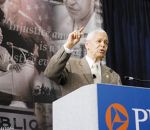by Larry Miller
For New Pittsburgh Courier
PHILADELPHIA (NNPA)—NAACP’s former chairman of the board Julian Bond was in Philadelphia March 25 discussing changing racial issues in America—issues that Bond said the nation couldn’t ignore just because Barack Obama is president.
With his usual focused clarity, Bond spoke at the PNC Bank’s Eastwick Center in Southwest Philadelphia, talking about the evolution of the Civil Rights Movement and the role that the NAACP played during that turbulent time in America.
 |
| SPEAKING AT PNC—Julian Bond, former NAACP chairman of the board, spoke at the PNC Bank’s Eastwick Center in Southwest Philadelphia.
|
He said it is foolhardy to think that because President Barack Obama made it to the White House that the victories and accomplishments of the Civil Rights Movement can now be dismantled. And he was most articulate in describing the plight that the nation and Black America is now in.
“While we are now poised for greater efforts and grander victories, we’re still being tested by hardships and adversities,” Bond said. “We’ve been rocked by an economy, where one writer said no past taxpayers covers billionaires’ bets. We’ve avoided another Great Depression; instead we’ve suffered a grieved recession. The decade that just ended was the worst for the U.S. economy in modern times.”
Bond said from December 1999 and December 2009, there was no net job creation and that middle-class Americans were earning less at the end of the decade than at the beginning. He said that one in eight Americans are on food stamps and many, at least 6 million, that is their only income.
But adverse economic conditions in the country are even worse for African- Americans, Bond said. He said Obama’s victory did not herald a post-civil rights America, or that racism had been vanquished or that structural inequality was erased from racist attitudes.
“Black Americans are more likely to be poor than rich and are worse off than their White counterparts,” he said. “Almost every social indicator from birth to death reflects Black and White disparities. The infant mortality rates are 146 percent higher for Blacks; chances of imprisonment are 447 percent higher, rates of death from homicide are 521 percent higher, lack of health insurance 42 percent more likely, the proportion with a college degree 60 percent lower and the average White American will live five years longer than the average Black American.”
Bond has long been a social activist who marched with Rev. Martin Luther King Jr. In 1965, he was elected to the Georgia House of Representatives and was prevented from taking his seat by those who objected to his position on the Vietnam War. In an amazing political twist, he was re-elected to his own vacant seat, un-seated again and after a third election and a unanimous Supreme Court decision, was re-seated.
In 1968, he became the first African-American to be nominated as a vice presidential candidate by the Georgia Loyal National Delegation to the Democratic Convention.
Since 1998, he has served as the chairman of the board of the NAACP. In 2008, the Library of Congress named him a “Living Legend.”
The event, “A Conversation in Courage” was sponsored by PNC Financial Services Group—one of the largest financial services organizations in the nation. It was originally scheduled for February, but was cancelled because of adverse weather conditions.
PNC’s president, J. William Mills, said this is the sixth year the organization has sponsored a Black History Month event.
“This has become a tradition for us,” he said. “Our whole commitment to diversity, as a company, makes all the business sense in the world. When we look at our customer base and our employee base, we realize we have a very diverse organization. Our emphasis on Black History Month is something that we believe helps bring us together as a company and helps show the heart that we have on diversity. You can’t do things like this just because it’s the right thing to do. But you have to encompass it more in how does it affect your business—what is it all about? This is all part of what we believe, that diversity is a key to our performance in the future.”
In speaking to the employees of PNC, Bond said that race relations in the nation are far better now than in the 1960s, but there is still much work ahead.
Bond, quoting the late historian John Hope Franklin, said that all Whites benefited from American slavery. All Blacks had no rights they could claim as their own, all Whites, including those who owned no slaves, were not only encouraged but also authorized to exercise dominion over all slaves, thereby adding to the system of control.
He said Jim Crow law might be dead, but racism is alive and well in America.
“W.E.B. Du Bois, one of the founders of the NAACP, was the first social theorist who linked class to race,” he said. “He understood then what we must understand now; race never stands apart from economic realities.
“We’re now asked to believe that 200 years of being somebody else’s property, followed by 100 years of oppression in the South and discrimination in the North, can be wiped away by four decades of half-hearted remediation and one presidential election,” Bond said. “The truth is that Jim Crow may be dead, but racism is alive and well.”
(Special to the NNPA from the Philadelphia Tribune.)